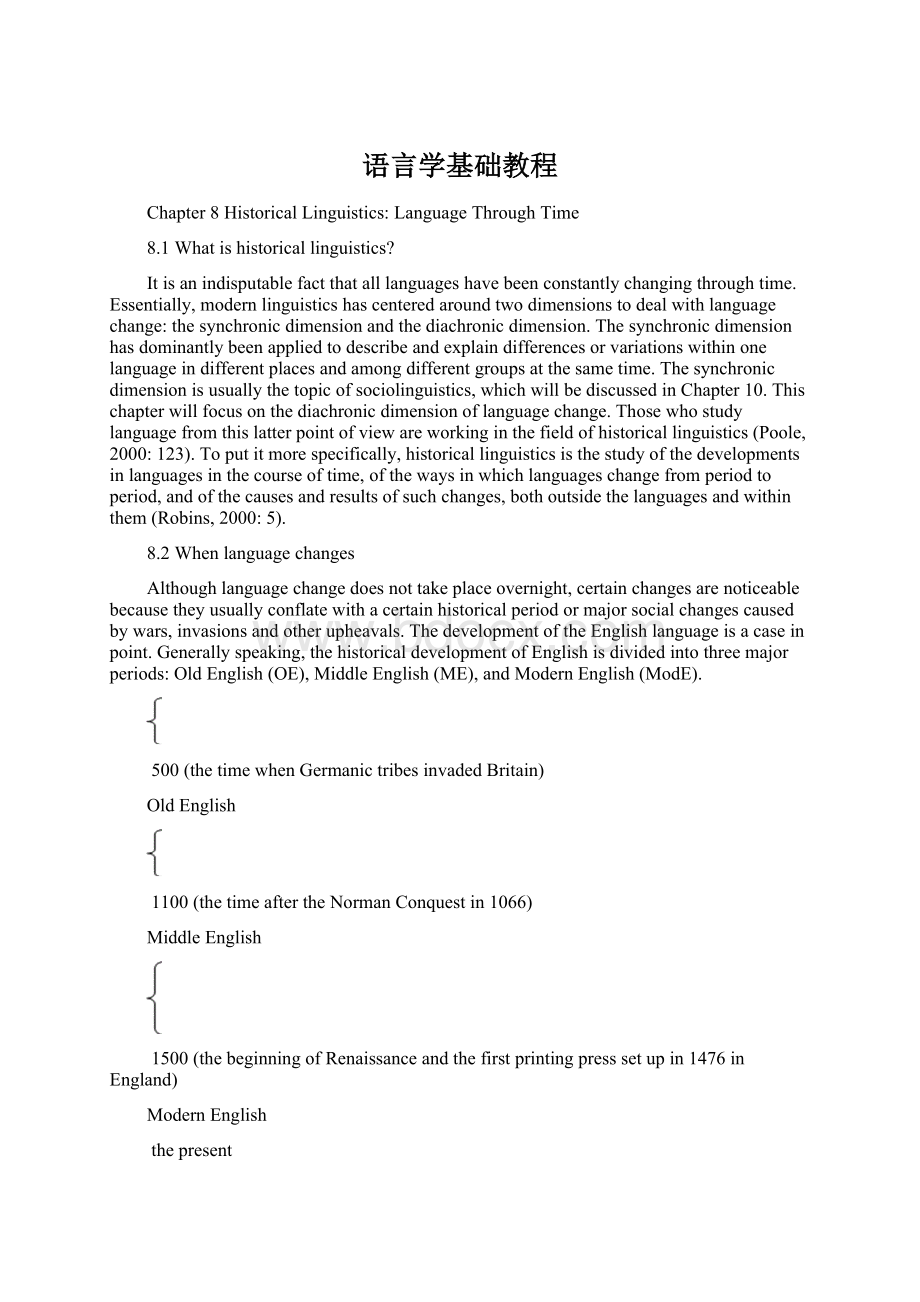语言学基础教程.docx
《语言学基础教程.docx》由会员分享,可在线阅读,更多相关《语言学基础教程.docx(8页珍藏版)》请在冰豆网上搜索。

语言学基础教程
Chapter8HistoricalLinguistics:
LanguageThroughTime
8.1Whatishistoricallinguistics?
Itisanindisputablefactthatalllanguageshavebeenconstantlychangingthroughtime.Essentially,modernlinguisticshascenteredaroundtwodimensionstodealwithlanguagechange:
thesynchronicdimensionandthediachronicdimension.Thesynchronicdimensionhasdominantlybeenappliedtodescribeandexplaindifferencesorvariationswithinonelanguageindifferentplacesandamongdifferentgroupsatthesametime.Thesynchronicdimensionisusuallythetopicofsociolinguistics,whichwillbediscussedinChapter10.Thischapterwillfocusonthediachronicdimensionoflanguagechange.Thosewhostudylanguagefromthislatterpointofviewareworkinginthefieldofhistoricallinguistics(Poole,2000:
123).Toputitmorespecifically,historicallinguisticsisthestudyofthedevelopmentsinlanguagesinthecourseoftime,ofthewaysinwhichlanguageschangefromperiodtoperiod,andofthecausesandresultsofsuchchanges,bothoutsidethelanguagesandwithinthem(Robins,2000:
5).
8.2Whenlanguagechanges
Althoughlanguagechangedoesnottakeplaceovernight,certainchangesarenoticeablebecausetheyusuallyconflatewithacertainhistoricalperiodormajorsocialchangescausedbywars,invasionsandotherupheavals.ThedevelopmentoftheEnglishlanguageisacaseinpoint.Generallyspeaking,thehistoricaldevelopmentofEnglishisdividedintothreemajorperiods:
OldEnglish(OE),MiddleEnglish(ME),andModernEnglish(ModE).
500(thetimewhenGermanictribesinvadedBritain)
OldEnglish
1100(thetimeaftertheNormanConquestin1066)
MiddleEnglish
1500(thebeginningofRenaissanceandthefirstprintingpresssetupin1476inEngland)
ModernEnglish
thepresent
Inabouttheyear449AD,theGermanictribesofAngles,SaxonsandJutesfromnorthernEuropeinvadedBritainandbecamethefoundersoftheEnglishnation.Theirlanguage,withtheGermaniclanguageasthesource,iscalled,thenamederivedfromthefirsttribe,theAngles.IthadavocabularyinheritedalmostentirelyfromGermanicorformedbycompoundingorderivationfromGermanicelements(Dension,1993:
9).FromthisearlyvarietyofEnglisc,manyofthemostbasictermsintheEnglishlanguagecameintobeing:
mann(“man”),cild(“child”),mete(“food”),etan(“eat”),drincan(“drink”)andfeohtan(“fight”).FromthesixthtotheeighthcenturiesAD,theAnglo-SaxonswereconvertedtoChristianity,andanumberofterms,mainlytodowithreligion,philosophyandmedicine,wereborrowedintoEnglishfromLatin,thelanguageofreligion.Theoriginsofthemodernwordsangel,bishop,candle,church,martyr,priestandschoolalldatefromthatperiod.Fromtheeighthcenturytothetenthcentury,theVikingsfromnorthernEuropeinvadedEnglandandbroughtwordssuchasgive,law,leg,skin,sky,takeandtheyfromtheirlanguage,OldNorse(Yule,2000:
218).
Intheyearof1066AD,theNormanFrenchconqueredthewholeofEngland,bringingFrenchspeakersintotherulingclassandthenpushingFrenchtothepositionasthe“prestigelanguage”forthenexttwohundredyears.Thislanguagewasusedbythenobility,thegovernment,thelawandcivilizedbehavior,providingthesourceofsuchmoderntermsasarmy,court,defense,prisonandtax(Yule,2000:
219).YetthelanguageofthepeasantsremainedEnglish.
BytheendoftheMEperiod,whenEnglishhadonceagainbecomethefirstlanguageofallclasses,thebulkofOElexishadbecomeobsolete,andsometenthousandFrenchwordshadbeenincorporatedintoEnglish,maybe75%survivingintoModE(Baugh&Cable,2001:
174).
DuringtheearlyModEperiod,whichcoincidedwiththeRenaissanceperiod,EnglishborrowedenormouslexicalresourcesfromtheclassicallanguagesofLatinandGreek.And,lateronastheBritishEmpireexpanded,therangeoflexicalinfluencewidenedtoevermoreexoticsourcelanguages(Dension,1993:
13).
ThetypesofborrowedwordsnotedaboveareexamplesofexternalchangesinEnglish,andtheinternalchangesoverlapwiththehistoricalperiodsdescribedabove.AccordingtoFennell(2005:
2),theyear500ADmarksthebranchingoffofEnglishfromotherGermanicdialects;theyear1100ADmarkstheperiodinwhichEnglishlostthevastmajorityofitsinflections,signalingthechangefromalanguagethatrelieduponmorphologicalmarkingofgrammaticalrolestoonethatreliedonwordordertomaintainbasicgrammaticalrelations;andtheyear1500ADmarkstheendofmajorFrenchinfluenceonthelanguageandthetimewhentheuseofEnglishwasestablishedinallcommunicativecontexts.Thus,thoseinternalchangeswillbeelaboratedbelowatthephonological,lexical,semanticandgrammaticallevels.
8.3Howlanguagechanges
ThechangeoftheEnglishlanguagewiththepassageoftimeissodramaticthattodaypeoplehardlyreadOEorMEwithoutspecialstudy.Ingeneral,thedifferencesamongOE,MEandModEinvolvesound,lexiconandgrammar,asdiscussedbelow.
8.3.1Phonologicalchange
Theprinciplethatsoundchangeisnormallyregularisaveryfruitfulbasisforexaminingthephonologicalhistoryofalanguage.Themajorityofsoundchangescanbeunderstoodintermsofthemovementsofthevocalorgansduringspeech,andsometimesmoreparticularlyintermsofatendencytoreducearticulatoryeffort(Trask,2000:
70,96).
8.3.1.1Phonemicchange
8.3.1.1.1Vowelchange
OneofthemostobviousdifferencesbetweenModEandtheEnglishspokeninearlierperiodsisinthequalityofthevowelsounds(Yule,2000:
219).Sometimesalanguageexperiencesawholesaleshiftinalargepartofitsphonologicalsystem.ThishappenedtothelongvowelsofEnglishinthefifteenthandsixteenthcenturiesAD,eachvowelbecomingcloser,thehighestbecomingdiphthongsasinthewordswifeandhouse(respectivelychangedfromwayf/wi:
f/andhaws/hu:
s/inOE).WecallthisshifttheGreatVowelShift(Poole,2000:
127),andthespecificchangesmaybediagrammedasfollows(Robins,2000:
342).
InME,thevowelsinnearlyallunstressedsyllabicinflectionswerereducedto[ә],spelled(Dension,1993:
12).Thegeneralobscuringofunstressedsyllablesisamostsignificantsoundchange(tobeelaboratedfurtherin8.3.3and8.3.4),sinceitisoneofthefundamentalcausesofthelossofinflections(Fennell,2005:
99).
8.3.1.1.2Consonantchange
Consonantsareproducedwithanobstructionoftheair-stream,andtendtobelessstableovertimethanvowelsinmostlanguages.Twofairlycommonprocessesareassimilationandlenition.
Assimilationistheprocessbywhichtwosoundsthatoccurclosetogetherinspeechbecomemorealike.Thissortofchangeiseasytounderstand:
movingthespeechorgansallovertheplacerequiresaneffort,andmakingnearbysoundsmoresimilarreducestheamountofmovementrequired,andhencetheamountofeffort(Trask,2000:
53).Instancescanbefoundinwordssuchasirregular,impossibleandillegal,inwhichthenegativeprefixesim-andil-shouldbe“in-based”inaccordancewithetymology.
Undertheinfluenceofneighboringvowels,consonantsmayalsobeweakened.Thisweakeningorlenition,canchangeavoicelessconsonantintoavoicedoneandaplosiveintoafricative(Poole,2000:
126).Instancesof[h]innativeEnglishwordsgenerallyderivefromthelenitionofanearlier*[k]:
suchwordsashead,heart,help,hillandheallbeganwith[k]inaremoteancestralformofEnglish,butthis[k]waslenitedfirstto[x]andthento[h],andthemodernlenitionof[h]tozeromerelycompletesaprocessoflenitionstretchingoverseveralthousandyears(Trask,2000:
59).
8.3.1.2Whole-segmentchange
Certainphonologicalchangesaresomewhatunusualinthattheyinvolve,notjustchangesinthenatureofsegments,butachangeinthenumberororderingofsegments,andthesearereferredtoaswhole-segmentprocesses(Trask,2000:
66).Thechangeknownasmetathesisinvolvesareversalinpositionoftwoadjoiningsounds.ThefollowingareexamplesfromtheOEperiod:
acsianaskbriddbirdbrinnanbeornan(burn)
fristfirsthroshorsewaepswasp
(Yule,2000:
220).
8.3.2Lexicalchange
AsdefinedbyFreeborn(2000:
23),lexicalchangereferstonewwordsbeingneededinthevocabularytorefertonewthingsorconcepts,withotherwordsdroppingoutwhentheynolongerhaveanyuseinsociety.Lexicalchangemayalsoinvolvesemanticchange,thatis,changeinthemeaningofwords.Thus,lexicalchangemainlyconsistsofadditionofnewwords,lossofwordsandchangeinthemeaningofwords.
8.3.2.1Additionofnewwords
Theconditionsoflifeforindividualsinsociety,theirartifacts,customs,andformsoforganizationareconstantlychanging.Accordingly,manywordsinlanguagesandthesituationsinwhichtheyareemployedareequallyliabletochangeinthecourseoftime(Robins,2000:
343).Floodsofnewwordsconstantlyneedtobeaddedtotheword-stocktoreflectthesedevelopments.Etymology,whichisthestudyofthehistoryofindividualwords,showsthatwhilethemajorityofwordsinalanguagearenativewords,theremayalsobeloanwordsorborrowedwordsfromanotherlanguage.Nativewordsarethosethatcanbetracedbacktotheearliestformofthelanguageinquestion.InEnglish,nativewordsarewordsofAnglo-Saxonorigin,suchasfull,hand,wind,red.Loanwordsarethosethatareborrowedorimportedfromanotherlanguage,suchasmyth,career,formula,genius.Apartfromborrowing,manynewwordsareaddedtoalanguagethroughword-formation.ThefollowingprocessesarequitepervasiveintheadditionofnewwordsintheevolutionofEnglish.
8.3.2.1.